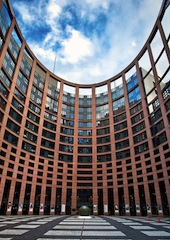European Election: Business as Usual
Claims about a watershed election are exaggerated, says the former UK Minister for Europe.
May 27, 2014

There is a widening gulf between the European elites and the citizens of Europe. The European Parliament election has exposed this chasm as never before.
Or so one would think when reading the British and French press or listening to London and Paris broadcasters. They see the outcome of the European Parliament election as a watershed moment after which politics is never going to be the same again.
However, these alarmist sentiments are much more of a reflection of the topsy-turvy character of French and British politics. The voters’ negative sentiments reflect almost entirely homespun phenomena, for which Europe, the EU and the Commission just serve as a convenient whipping boy.
Viewed from a broader perspective, not much happened. There was the same low voter turnout across Europe of around 43% — six out of every ten voters said the election did not interest them.
The return of the old guard
Moreover, they basically voted the same old crowd back in. Five hundred sixty-nine of the European Parliament’s 751 members (or 76%) come from the big party machines — Christian Democrats, Social Democrats, Liberals and Greens — that run most European countries, in various coalitions.
Incumbent governments of right and left — Angela Merkel in Germany, Mario Renzi in Italy, Donald Tusk in Poland, Victor Orban in Hungary, Mark Rutte in the Netherlands — did pretty well.
There were exceptions. Syriza, the populist left party in Greece where the austerity regime has been particularly cruel, won a narrow lead over the ruling conservatives of New Democracy. But Syriza is not calling for the abolition of the Euro or for Greece to quit the EU.
What it wants is an easing of fiscal rules that is ironically along the lines of Britain’s Conservative-led government, where debt and deficit are twice the level of the Eurozone enforced limits. In addition, the Bank of England has been printing money as if John Maynard Keynes was in charge.
In fact, Europe’s far left did reasonably well and its group in the European Parliament has got bigger. But at 47 MEPs — or 6% of all seats — it is not about to turn Europe red.
France: From communists to the Front National
Marine Le Pen, the head of the rightist Le Pen dynasty — almost a royal family in France — shook the tree by winning 25% of the vote. That is notably the same share of the French electorate that voted regularly for French communists between 1945 and 1975.
In the first direct election to the European Parliament back in 1979, the French Communists got 21% of the vote and 19 MEPs. In fact, the longest serving MEP is a French communist from that era.
Like Marine Le Pen, the then French communist leader, Georges Marchais used to rant against Brussels bureaucrats. He, too, demanded that no foreign workers should be allowed into France as “French jobs should be reserved for French workers.” And French communist mayors bulldozed buildings put up by Muslim immigrants — just as Marine Le Pen and her Front national rail against Muslims in France. Plus ça change…
French premier Manuel Valls has described the vote for the extreme Front National as an “earthquake.” But surely he cannot have forgotten how Marine Le Pen’s father Jean-Marie Le Pen defeated the Socialist presidential candidate Lionel Jospin in the 2002 contest for the Elysée.
That was a much bigger national shock than a few extreme rightist French MEPs going off to claim generous salaries and expenses in Strasbourg where the European Parliament meets.
In Britain, the anti-EU United Kingdom Independence Party (UKIP) did well. It thoroughly embarrassed the main parties by scoring more votes than Conservative, Labour or Liberal Democrats who control the seats in the House of Commons. But the UK voters showed what they really thought of the election as seven out of every ten voters stayed at home.
Protest vote time
The European Parliament election in many countries is a cross between a protest vote moment to give the establishment parties a kicking and a chance to send all sorts of odd-ball party candidates to the European Parliament, including experts on UFO sightings.
The pure proportional voting system used at the European level allows some ugly MEPs from neo-fascist and openly anti-Semitic parties to be elected. But they tend to be shunned and have no influence.
Logically, the two politicians most united in their dislike of the EU, Marine Le Pen and Nigel Farage, should link up. They have a combined total of 50 MEPs after the European Parliament elections. But Farage says that the Front National is “toxic” and has “embedded anti-Semitism” — a charge which Le Pen denies and has led her to file libel suits against Farage.
The problem for the extreme and fringe MEPs, now that they have got to the European Parliament, is that they can rarely agree on anything. Madame Le Pen, for her part, says she will block the working of the Parliament.
And UKIP’s MEPs have already said they will draw their salary and expenses, but stay in England. What they plan to do is to campaign for a referendum to get Britain to quit the EU.
Prime Minister David Cameron has promised an In-Out referendum in 2017 if he is re-elected next year. He says he wants Britain to stay in the EU, but only if major concessions are made that allow Britain to become a semi-detached EU member state.
Everything still up in the air
The 2014 European Parliament was meant to be a contest between two candidates for the European Commission president — the German Social Democrat, Martin Schulz, and the Luxembourg EU veteran and the long-serving Christian Democrat prime minister, Jean Claude Juncker.
But Schulz has not won enough MEPs to have a real claim on the job and while Juncker’s center-right group is the biggest, with 212 MEPs out of 751, its share of the vote has gone down. That lessens his claim on the European Commission president job.
Instead, it will be 28 heads of government who will meet and carve up jobs like the President of the Commission, the President of the European Council of national leaders, and other posts including the EU Foreign policy chief.
So the European Parliament election has settled nothing. Corridor wheeling and dealing will continue. Compromise and consensus will determine European legislation. The extremes of left and right will remain on the fringe.
There is no answer to genuine fears over mass arrivals of immigrant workers. The US-EU transatlantic free trade deal — TTIP — will remain difficult to complete, as European voters are nervous about any lessening of state protection over health care provision or cultural and creative industries.
There will also be more pressure on GAFA — Google, Apple, Facebook and Amazon — as both Europe’s right and Europe’s left dislike the monopolistic power of the U.S. internet behemoths. The 26 million Europeans without work are unlikely to get a job following this election. The British debate over Brexit — Britain exiting the EU — will intensify.
Takeaways
Read previous

The NRA: Still America’s Cosa Nostra
May 27, 2014
